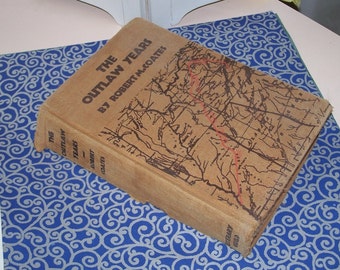I find nothing to celebrate today about this country, other than some people keep trying to push back against the protected, openly armed cadres that are ready to go if anyone attempts to bring back the former democracy that was in place before Reagan's first term.
They've got all the structures firmly in place now. Excellent planning on the part of the One percent. They did an impeccable job getting all these people to go against their real interest in favor of acting out hatred with impunity in a phony facade of superiority as white men and women against all women, African Americans, immigrants and all the others of us.
Spending today organizing packing for the Texas trip and reading The Outlaw Years: The Land Pirates of the Natchez Trace (1930) by Robert M. Coates * -- dedicated to Malcolm Cowley. I must I stumbled upon mention of this work via reading in Mississippi writers, as it's all new to me. I found the text from a search in Bobcat, which directed me to the U of Michigan, which has a google digital edition that one can download as pdf, complete with illustrations.
It opens with a b&w reproduction of an Audubon painting of Natchez circa 1805 -- before the slave market was pushed out to the Forks in the Road, which we can see in the painting. That bluff above the river we see on our left? That where the slave traders threw the bodies of the dead and dying merchandise, creating "a noisome and pestilential nuisance" which was never cleaned up until the market was closed with the Civil War.
Now it's paved over and lined with automotive shops of all kinds. You can still see those steeples from there though.
All the following -- plus even more! is in the first chapter.
We get going with Daniel Boon [sic] ** (1760) and labor in James Calk's starved 1775 expedition that follows in Boon's path.
In 1779 the Overmountain Men party set off, including Colonel Donelson (he for whom Fort Donelson is named) and his daughter Rachel (the future wife of Andrew Jackson) is with them. Their flatboat is aptly named the "Adventure" as their river journey is a non-stop hair-raising series of events, all the way to Muscle Shoals (located right at the borders of Alabama, Mississippi and Tennessee). Indians hunt them the entire way. Many members are lost, to Indians and to the river -- an entire boatload to both early on -- and to the weather. This section quotes copiously from Donelson's:
Journal of a voyage, intended by God's Permission, in the good Boat Adventure, from Fort Patrick Henry on Holston river to the French Salt Springs on Cumberland River,
kept by John Donaldson.”
Decem. 22 1779
From there they drift down the Tennessee, in search of the Ohio River. More privations, starvation and other dangers are surmounted, and thus Donelson, James Robertson and the Overmountain men found Nashville in 1779.
From Outlaws:
Few of them lived long, or died in any way but violently. Anthony Bledsoe was killed in July, 1787, his brother Isaac in 1793: both, fighting Indians. Two sons died in the same way. Captain Hall wasThis is just the beginning The Outlaws. These are Andrew Jackson's people. Nobody these days is as tough as they were. I am not sneering here. I mean it. The guys running around today,waving their prosthetic masculinity enhancers in
attacked while moving his family to the settlement at Mansco's Lick; he and his son were killed and scalped. But while they died, others came to replace them. One sees them, their figures shadowy and gigantic, like the figures of men seen moving in a mist. . .
This is a lush book, despite filled with violent event after violent event. For an example of what I mean, here's this:
... the dreamed-of Mississippi, that lay like a liquid spine in the wilderness' midst.The metaphor of the Mississippi River as the nation's "liquid spine" runs shivers down my own.
Waiting for the rain to end, so I can pick up a few things from the supermarket. The rain will be over, we are promised, by the time we head off for Lincoln Center. It's supposed to be very nice the rest of the holiday weekend that celebrates Rah Rah Rah USA We Got Even More Guns Today!
Considering my state of mind since the Hobby Decision it's probably for the best that we were too under the gun to join our friends at the beach house on Long Island for the long weekend.
------------------------
* Coates is an interesting figure in his own right (1895 - 1973), who for years was The New Yorker art critic, and wrote fantastical fiction. One wonders what prompted him to write this book about the history of the Natchez Trace region.
** Perhaps one can no longer assume these days that everyone is familiar with the iconic American figure of Daniel Boone. Is this so?


No comments:
Post a Comment